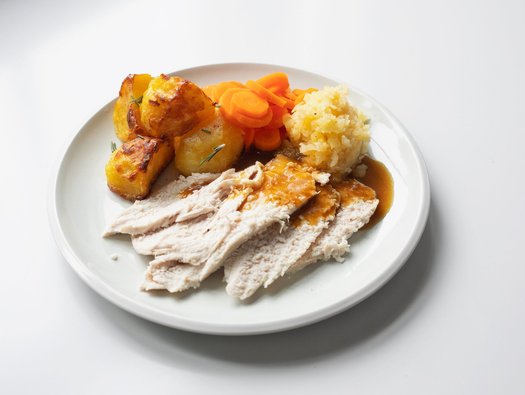Roast chicken

A roast dinner that’s low in potassium, phosphate, and salt. It's also high in protein so makes a great hearty post-dialysis meal.

A roast dinner that’s low in potassium, phosphate, and salt. It's also high in protein so makes a great hearty post-dialysis meal.
1 medium chicken, approx 1.5-1.7kg (100g of cooked chicken per person)
1 small onion, roughly chopped
1 lemon, halved
Cracked black pepper
1 teaspoon dried sage
4 medium potatoes (approx. 500g) peeled and cut into four
2 tablespoons olive oil
1 sprig rosemary
250g swede, peeled and chopped into chunks
40g unsalted butter
250g spring greens, shredded, or carrots, peeled and chopped
250ml low-salt chicken stock
15g plain flour
Heat the oven to 180°C/ 160°C fan/ gas mark 4. Put the chopped onion into the bottom of a roasting tray. Stuff the lemon halves into the cavity of the chicken and sit the chicken on top of the onions. Season the chicken with black pepper and the dried sage, then rub into the skin. Roast the chicken in the oven for 1 hour and 20 minutes.
Put the potatoes into a pan of cold water and bring it to the boil. Cook until the potatoes are soft, then drain in a colander. Shake the potatoes to rough the edges up a little. Cover with a tea towel to trap any remaining steam.
Heat another roasting tin with olive oil in the oven for 5 minutes, then remove and add the par-boiled potatoes, turning them to coat in oil. Add the rosemary and return to the oven for 45 minutes.
Add the swede to a saucepan of cold water and boil until soft, then drain and return the swede to the pan. Add the unsalted butter and black pepper to taste and mash, then keep warm until serving. 10 minutes before serving, add the shredded spring greens or chopped carrots to a saucepan of water and boil until cooked. Once cooked through, drain and discard the water.
Take the chicken out of the oven, remove from the roasting tin and allow any juices to drain back into the tray. Set the chicken to one side and allow to rest for 15 minutes. Put the roasting tin over a low heat on the hob and stir in the flour. Cook until the juices have absorbed. Add the stock slowly, stirring until the gravy thickens. Strain and set aside.
Remove the potatoes from the oven. Serve the chicken, potatoes and vegetables on warm plates and pour the gravy over the top
The potatoes are the main source of carbohydrate in this recipe, and the value has been provided for those who have been trained in insulin adjustment.
This recipe is low in potassium, despite the use of some high potassium foods, such as potatoes, chicken, and vegetables. This is because the quantities have been kept to a minimum, therefore please ensure you follow the quantities for all the ingredients and the serving sizes.
This recipe is also low in phosphate, however it still contains phosphate, provided by the chicken, therefore, if you are prescribed a phosphate binder you should take as directed.
This recipe is high in protein, which makes it suitable for those advised to eat more protein, particularly those receiving dialysis.
Use gluten-free flour for the gravy.
Best eaten straight away. Leftover chicken can be stored in the fridge for a later meal for up to 3 days.
The whole family will enjoy tucking into our hearty, filling meals on a chilly winter's evening.
You can enjoy a wide variety of delicious and healthy food when you are living with kidney disease. All Kidney Kitchen recipes are analysed and approved by kidney dietitians. Search through our kidney-friendly recipes or filter them by category below.
This low potassium, low phosphate and low salt recipe makes eight portions of nut roast and enough side vegetables for four people.
By giving us your email address, you're giving us permission to send you the latest news from Kidney Care UK. Further information about how we protect and use your personal data is available in our Privacy policy. If you would like to change the way we communicate with you at any time please email [email protected]. You can unsubscribe at any time by using the link at the bottom of every email we send.